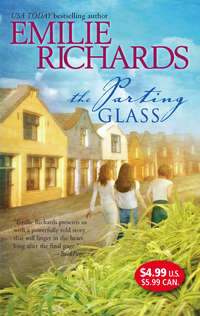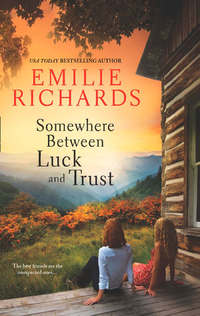
Полная версия
One Mountain Away
Hearty is blinking hard, as if trying to remember what’s just happened.
“You hurt, Mrs. Pittman?” Mr. Klaver asks, shoving Hearty to one side. “He hurt you?”
She looks a little dazed, but she shakes her head and begins to brush off her checkered dress. “He wants money.”
“You don’t give a man like this money.” Mr. Klaver looks at Gran. “What are you going to do about him? Why’d you let him come here, anyway?”
I want to weep, but Mrs. Pittman intervenes. “What are you saying? She’s an old woman. There’s nothing she can do, but the men in this community might consider forming a plan. She and that girl need protection, not accusations.”
“Hearty’s never hurt either of us,” Gran says. “He just drinks.”
“And lies and steals,” the preacher says. “Don’t pretend he don’t. He’ll take anything that’s not nailed down and claim he didn’t, so he can buy himself more liquor. People ’round here pretend they don’t see, because they respect you. But one of these days he’ll go too far, and somebody’ll come after him with a shotgun.”
“I’ll take…my shotgun to them first,” Hearty says, just before he bends double and vomits at the preacher’s feet.
“You’uns leave us.” Gran shakes her head as her son-in-law retches and heaves. “We’ll get him out of here. But we’ll have better luck doing it without you. I’m sorry it’s come to this.”
“No,” Mrs. Pittman says sharply. “These men will walk him back to wherever he came from. I’m taking you home myself. You got stuck with Hearty Hale when your daughter made a foolish decision, but you don’t have to be stuck with him today. Now come along.”
I hope my grandmother will refuse, that the command in the other woman’s voice will anger her enough she’ll stay right here. I don’t want to walk back to the preacher’s car and face the knots of churchgoers again, not as long as I live. But Gran looks the way a dog does after he’s been whipped. She doesn’t have the strength to refuse. Instead, she starts hobbling after the preacher’s wife and beckons for me to join her.
The walk back through the lot and over to the preacher’s car is the longest I’ve ever made. I can feel every eye staring at me, particularly Sally’s, and I know what everybody is thinking.
If I ever harbored hope that someday people might overlook the man who fathered me and see me for the person I am, now I know that hope was foolish. I will always be Lottie Lou Hale, the daughter of no-good Hearty Hale. And as long as I live in Trust, North Carolina, my future has already been decided.
Chapter Five
THE COFFEE SHOP where Charlotte had settled to write in her journal had been recently remodeled. Now it was officially a bistro, with a newly painted sign announcing it had evolved, but it was still called Cuppa. The Orange Peel, a music venue down the street, was probably awakening for a long night and beginning to attract patrons, and she was glad she had arrived early enough to find parking.
Cuppa had a row of tall windows looking over the street and fancifully trimmed topiaries between each set. Ferns hung in the window, and the hostess stand was flanked by trios of potted palms. Once past the hostess stand, though, Charlotte had seen just how casual the little restaurant was. Denim ruled, and several patrons had set up laptops on their tables. More were talking on cell phones with nothing in front of them except steaming mugs. A coffee bar jutted from one side of the room, and two young women stood there chatting and waiting for the barista to supply their order. Maybe the owners had added space for more tables and real food, but at heart the place probably hadn’t changed much.
When she had asked for a quiet table, a young man in a green T-shirt had led her as far away from the hubbub as he could without pushing her through the emergency exit, and for a long time she’d had the area to herself. But now that she was finished writing in her journal, it was dinnertime, and a family with two squabbling preschoolers was divvying up a pizza at the table beside hers. A middle-age couple, who looked as if they’d either had a bad day or engineered one for everybody else, had just been seated steps away from both tables, and the man, in his early forties, was squinting at the menu as if it had been salvaged from a shipwreck.
Charlotte knew she had taken up her table for too long, ordering coffee, then an untouched pastry, out of guilt. Now she was finally hungry and knew she should probably try to eat something before she left for home. Cuppa wasn’t exactly her usual, much more casual than the places she frequented with friends and colleagues, but the atmosphere was upbeat and the pizza at the next table smelled wonderful.
She studied a menu snuggled alongside a brief wine list between the sugar dispenser and the salt and pepper shakers. The selection was simple. Pizza, salads, wraps, a variety of sandwiches and a few Italian specialties. As ordinary and ubiquitous as the choices were, the ingredients seemed innovative. The Cobb salad had pea shoots and shiitake mushrooms, the Greek wrap featured baby spinach, fire-roasted red peppers and sun-dried tomatoes.
She had sat there long enough for a shift change. Now a tall young woman approached, dressed in another of the restaurant’s dark green T-shirts paired with an ankle-length khaki skirt. She had long sun-bleached hair pulled back in a low ponytail, masses of freckles and eyes rimmed with sandy lashes. The all-American, girl-next-door essentials were marred by a gold ring in her nose and the winged edges of a tattoo just visible on the right side of her neck. Charlotte thought the image might be a fairy or a dragonfly.
Green eyes flicked to the menu in Charlotte’s hand, then back up again, before the young woman spoke. “Hi, my name is Harmony, and I’ll be happy to get you anything you’d like.” She smiled shyly to show slightly crooked teeth.
“You know what, the eggplant provolone pizza sounds wonderful,” Charlotte said. “Is it as good as it sounds?”
“I like it.”
Charlotte ordered the pizza and a salad, and asked for a bottle of sparkling water to go with them.
The young woman took her order, then moved to the couple who had just arrived and introduced herself to them, as well.
“Harmony?” the man asked loudly enough that half the restaurant could hear him. “I bet that’s not what your mother named you.”
The young woman looked puzzled. “Harmony No-Middle-Name Stoddard, right there for all the world to see on my birth certificate. May I get you something to drink before I tell you our specials?”
“I bet you were born in Asheville.”
Charlotte was trying not to eavesdrop, but it was impossible, since the couple were so close. She knew not everyone held their mountain community in the highest regard. Some of her colleagues thought Asheville was outdated and outclassed, a frontier hippie outpost with a redneck contingent that barely kept it from tumbling off the left side of the universe. Luckily most of them kept such unpalatable sentiments to themselves, at least in public, but this man had either had too much to drink already, or too many frustrations.
The waitress looked perplexed, and the man’s companion, a frumpy brunette who looked only marginally more pleasant, intervened. “My husband’s just saying it’s not as uncommon a name here as it is in other places. He’s making an educated guess.”
“Harmony, Serenity, Moonbeam, Sagittarius.” The man picked up the wine list and waved it as if he were shooing flies. “Do you sell wine by the bottle?”
“I was born in Kansas, and no, we only sell by the glass. What would you like?” The young woman looked composed, but wary, as if she understood she’d been insulted and was hoping to get beyond it.
“I’ll have a glass of red wine,” the woman said. “Cabernet?”
Harmony nodded. “And for you?” she asked the man.
“Whatever…”
“Then shall I bring you the cabernet, too?”
He gave a curt nod.
Charlotte knew all too well what the young server was probably feeling. Years had passed since she’d waited on tables herself, but it wasn’t a time in her life that was easily forgotten. When a restaurant wasn’t too busy and customers were friendly, the work was tolerable, even enjoyable. But when customers were rude, like this man, then a shift could last forever.
Harmony returned with Charlotte’s water and promised the pizza would be ready in about twenty minutes. Then she gave the couple their wine and set ice water in front of them, too. “Would you like to hear our specials?” she asked them.
“Not if they’re low-fat, whole grain and heaped with vegetables.” The man sneered.
“You’ve pretty well described it. You might like the pot pie, though, our chef—”
“It’s an exaggeration to call anybody who works in this place a chef,” he said. “We’ll split a large eggplant-provolone pizza.”
“I have to apologize,” Harmony interrupted, “but the chef just told me he used the last of the eggplant on another order. Could I interest you in our pissaladière? It’s a white-onion pizza with thyme, rosemary and feta, and—”
“Unbelievable.”
Charlotte frowned. The girl looked pale, as if having to deal with the man’s bad humor was taking its toll.
The woman poked her menu in Harmony’s direction, as if to forestall more of her husband’s bad temper. “We’ll split a large one, and bring us two green salads, please. I’ll have the raspberry vinaigrette on the side. He’ll have the specialty mushroom blue cheese.”
“Out of eggplant?” he said loudly, after Harmony had left and after he’d taken a long sip of his cabernet.
In a few minutes Harmony returned with salads on a tray. She gave Charlotte hers first, then placed the woman’s in front of her. Just as she was about to set the man’s on his place mat, one of the children at the next table screamed and launched herself off her chair, slamming into the server, who dropped the ceramic salad bowl. Salad flew over the table and into the man’s lap, and the bowl bounced against the table edge and shattered when it struck the floor.
“I’m so sorry,” the mother at the next table said, clearly horrified at what her daughter had done. She grabbed the girl’s arm and hauled her back to her chair, while the man leaped to his feet, eyes blazing.
Harmony, who could not have avoided the accident even if she’d been an Olympic gymnast, tried to apologize, anyway, but he was furious. Dressing splattered his pants and sport coat, and lettuce tumbled to his shoes.
“You need a new profession,” he said. “Who told you waiting on tables was a good career move? Get the manager. Now!”
The young woman’s eyes glistened, and her freckles stood out in sharp relief on pale cheeks. “She…she’s stepped out. I’ll send her right back when—”
He stopped dabbing at the stain with his napkin and threw it on the table. “You think we’re staying?”
“Let me take your number, and I’ll be sure she calls—”
“You’ll be sure?” He sounded as if he was sure she wouldn’t get that right, either.
The young woman looked down at the vegetables and crockery covering the floor at their feet, the dressing oozing into a chunky cheese puddle dotted with green, and suddenly her face drained of all color. She closed her eyes, covered her mouth with her hand and took off toward the coffee bar.
Charlotte could remain silent no longer. With one smooth motion she pulled a pad out of her purse, stood and held it out to the man. “Do us all a favor and put your number there. You can leave it on the way out. And maybe you can add an apology.”
He had the grace to look ashamed, or maybe he was just worried Charlotte was going to continue. “Never mind.” He stood and motioned to his wife. “Let’s get out of here.”
He rounded the table and started toward the door, his wife close behind him.
Charlotte started to sit back down, but she realized what little appetite she’d had was gone now, and she was too upset to eat. Instead, she took out her wallet and dropped two twenties on the table before she started toward the door, too.
Harmony was nowhere to be seen.
* * *
In Charlotte’s opinion, her house was the finest example of Colonial Revival architecture in upscale Biltmore Forest. Built from salmon-tinged brick with imposing white pillars and decorative woodwork, it ruled over its neighbors from a rise in the center of a two-acre lot.
The house was much too large for a woman alone, which hadn’t stopped the newly divorced Charlotte from snapping it up when it came on the market ten years ago. She’d had her eye on the house for years, had even tried to buy it once before when she was still married. So when it had come back on the market a second time, she’d made sure she was first in line.
Since then, despite a sagging economy, the house had increased in value, thanks to her constant attention to maintenance and landscaping. Of course, even though she was free to gloat, there was nobody who cared. The house inspired one of two undesirable reactions. The first was awe, often tinged heavily with envy. The second was worse, something she could only tag as dismay. The house clearly sucked up money and resources without mercy or discrimination.
The house in Biltmore Forest had been a dream, a symbol, a satisfied “yes” at the end of a long, torturous road.
Or so she’d thought.
This evening she turned into the driveway with groceries tucked into the passenger’s seat. After leaving Cuppa she had stopped at Earth Fare to stock up on fresh salads and baked goods, because her refrigerator was as empty as the rest of her evening promised to be.
Right now all she wanted was to put the bags in the refrigerator without even bothering to unpack them and fall asleep in her bedroom, fully clothed. She was so tired every cell in her body had shriveled from fatigue.
She didn’t bother with the garage. She pulled into the stone-paved parking area hidden behind a bower of English ivy and turned off the engine.
“Okay, now you’re getting out,” she said out loud, then forced herself to follow her own orders.
Inside, she put away the groceries and told herself it was good to be home. But once she’d made herself a cup of hot tea and a slice of toast, she lay exhausted on the living room sofa, staring at the ceiling. In the end, as the grandfather clock tolled ten, she rose, smoothed wrinkles from her clothes, closed the front door behind her and headed back to Cuppa.
After being forced to park several blocks away on a side street, she stood outside the restaurant once more. She doubted Harmony Stoddard would appreciate reacquainting herself with a witness to her unfortunate dinner-shift encounter, but Charlotte wanted to be certain that the bad-tempered man hadn’t complained. And if someone else had spoken to the manager, the mother at the next table, perhaps, or another server, Charlotte wanted to be sure Harmony wasn’t blamed for something that was certainly not her fault.
Inside, the hostess stand was empty. Farther in a few people sipped coffee, but one of them was packing up her computer. A muscular middle-age man in one of Cuppa’s signature shirts stopped Charlotte as she continued toward the back.
“We’re closing,” he said. “Did you need something?”
“By any chance are you the manager?”
“She went home early. I’m in charge.”
“I was here earlier. I was sitting in the back, and a child at the next table slammed into my server and sent salad flying all over a man at another table. I just wanted to be sure the server didn’t get into trouble. I was right there, and it was absolutely not her fault.”
He looked surprised. “You came all the way back to tell us that?”
“And to make sure she’s okay.” She decided to level. “The man behaved badly. He didn’t apologize. I thought somebody ought to.”
“You know how rare that would be?” He ran his hand through short-cropped hair. “Who was it? Harmony?”
“Uh-huh.” She wondered how he knew.
His mouth twisted into a wry smile. “She had a bad night. I didn’t know why.”
“Is she here? Maybe I could make it a better one.”
“She left about half an hour ago, after she finished her shift.”
Charlotte felt a pang of regret. “Maybe I could write her a note?”
“Sure. Just leave it on the coffee bar. I’ll make sure she gets it.”
Charlotte wandered over and sat on a stool. She penned a few lines on a sheet of notebook paper and signed it. Then, on a whim, she added her business card and circled her cell phone number, although she doubted the young woman would call.
With nothing else to do she left the note and trudged to her car. The air was cool, and while the street wasn’t deserted, she felt utterly alone. On the street, in the city, on good old Mother Earth. She thought of the memorial service where she had not been welcome. She thought of the wary expression in her own minister’s eyes.
She thought of her granddaughter climbing to the top of a jungle gym, unaware that her grandmother was sitting just yards away watching her.
She slowed her pace. She had nowhere to go except home, and nothing to do there but think.
If she hadn’t slowed she wouldn’t have glanced into the car parked in front of her. Under the light of a streetlamp the sedan looked like something General Motors had long since discontinued. Rust etched wheel hubs. The rear door had been badly dented and someone—clearly not a professional—had tried to hammer it back into shape. Most important, as Charlotte drew even with the car, what she saw inside made her stop and stare.
The woman in the backseat, head pillowed on a blanket and another blanket drawn up around her, was all too familiar.
Charlotte debated what to do. She’d come to find Harmony Stoddard, but not like this. Before she could make herself continue along the sidewalk, Harmony’s eyes opened, and the two women stared at each other.
“I’m sorry,” Charlotte said, since only a pane of glass separated them. She started forward, then she stopped and went back. “Are you okay?”
Harmony was sitting up now, and she wiped her eyes before she moved over to the door and opened it, swinging her long legs over the side to face Charlotte.
“What are you doing here?” She didn’t sound angry.
“Well, right now I’m on my way to my car, but I was just at Cuppa to find you. I wanted to apologize. That man behaved so badly, and I wanted to be sure you weren’t in trouble for anything he did or said.”
Tears glistened on Harmony’s cheeks, and she rubbed them away with her fist before she spoke. Charlotte was reminded of her daughter as a toddler. Taylor had always done exactly that. Taylor, the daughter she hadn’t spoken to for almost eleven years.
“You didn’t have to come back. It was okay.” Harmony got out of the car and stood with her back to it.
“It wasn’t okay.” Charlotte debated what to do or say next. Part of her thought she ought to continue to her car. But suddenly the conversation wasn’t about a stranger’s bad manners anymore. It was about so many other things.
“You’re not okay,” she said. “Are you sleeping in your car tonight?”
“No…” Harmony bit her lip. “Not for the whole night, anyway.”
“Just part of it?”
“I’m…I’m staying with a friend.”
“You can’t get in? You don’t have a key?”
“That’s not it.” The young woman seemed to debate with herself. “She’s got a date. I don’t want to be there when…”
Charlotte understood. “Oh, right, I see.” She hesitated. “It’s a small place, I guess?”
“Like a closet, and I’m crashing on her sofa until I can find something better. I—” She shook her head.
“You’ve been there awhile?”
“You don’t want to hear all this.” Harmony smiled a watery smile. “This isn’t your problem, right?”
“Absolutely not. Not one bit.” Charlotte smiled, too. “So tell me, anyway.”
Harmony started to cry. Charlotte wasn’t sure what to do, but before she could decide, she’d put her arms around the girl and pulled her close.
“When was the last time you ate?” she asked, as Harmony, bending at the waist, sobbed against her neck. She felt the girl’s shoulders hunch in answer.
“Will your car be okay here tonight?” Charlotte asked, making a decision.
“I…I guess. But I don’t—”
“You’re coming home with me, and don’t worry, you can call your friend and tell her where you are. You’ll be safe. I’m not a serial killer.”
“You don’t have to do this.”
Charlotte was afraid she did. She was afraid no one needed to do it more.
Chapter Six
LIVING IN ASHEVILLE was a trade-off for Taylor Martin. At first, after Maddie’s problematic birth, the city of Taylor’s own birth was the only place she could live. Without her father’s help, both financial and emotional, she would never have been able to support herself and care for her daughter.
Jeremy’s parents, who also lived in town, had helped, as well, and despite Taylor’s disdain for her daughter’s father, she couldn’t dislike the senior Larsens. From the beginning they had stepped up to the plate, insisting that Jeremy acknowledge the baby, then offering financial support. After Maddie’s birth they had put their son through college, or tried to, but they had also made certain Jeremy understood that once he was earning a living, they expected him to take over the child support payments.
The Larsens were now only part-time Asheville residents, migrating to Florida for the coldest months, but when they were in town, they were enthusiastic babysitters, available at a moment’s notice. While nowadays Jeremy paid his own child support, his parents paid all the health care extras insurance didn’t cover.
Taylor knew she should consider moving to a city with more and better jobs, perhaps one with specialists making their mark in neurobiology. But nowhere else on the planet would she have the support system she had here, and nowhere else would Maddie be surrounded by so many people who loved her.
This evening she reconsidered that conclusion. Classes at Moon and Stars were physically grueling, and in addition to yoga, she also taught Pilates at a local gym. For this she was paid enough to keep body and soul together, but not much more. She had a degree in Health and Wellness promotion and had hoped to go on to something in the medical field, but earning one degree had been difficult enough, even with a network of friends and family.
Asheville was short on jobs and long on people with the same kind of skills she had. At times like this she found herself imagining a less exhausting way to survive. The truth was, she was lucky to have the jobs she did. Her employers at both the gym and the yoga studio understood that sometimes Maddie needed Taylor more than her students did. That benefit was impossible to beat.
This evening, when she pulled up in front of her house, she stared up at the crescent moon rising overhead. She knew Maddie was all right or her father would have called. Her daughter was probably sleeping off the effects of the most serious seizure Taylor remembered in years, what her doctor had called a “breakthrough” seizure on the phone, since it had been an escalation of symptoms. She’d been so sure they had finally gotten the medications right. Dr. Hilliard had been cautiously optimistic, as well. And now they might have to start all over.
She got out of the car and only then noticed that her father’s Acura was no longer in front of her house. His spot had been taken by a familiar yellow Volkswagen bug.
The front door of the house was unlocked, which was no surprise. Taylor locked up at bedtime, but the neighborhood was quiet, and the neighbors on both sides had great-grandchildren and time to watch the world go by outside their windows. Her neighbors were another reason she didn’t want to move to a better job in a faceless city.
She closed the front door loudly so her guest would know she was home. The house was so small she was through the living room and kitchen in seconds, then beyond to the family room that was just large enough for a small television and sofa. The television was off and Samantha Ferguson was curled up on the cushions, but if she’d been sleeping, she wasn’t now. She smiled, arms out and fists clenched as she stretched.







